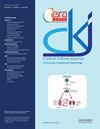Risk factors for major bleeding in patients with atrial fibrillation and CKD G3-G5D on oral anticoagulants
IF 3.9
2区 医学
Q1 UROLOGY & NEPHROLOGY
引用次数: 0
Abstract
Background Patients with chronic kidney disease (CKD) and atrial fibrillation (AF) on oral anticoagulants (OAC) are at high risk of bleeding. Determinants of major bleeding risk in OAC-users with AF and CKD are not well established and available bleeding score systems do not perform well in CKD. This study aims to present risk factors associated with major bleeding in a Swedish cohort of OAC- treated patients with CKD GFR category 3–5D (G3-G5D). Methods A Swedish register-based cohort study including patients with AF and G3-G5D on warfarin or DOAC between 2009–2018. Data collected from high quality registers including Swedish Renal Registry and Auricula, a register for AF and oral anticoagulants. Risk factors for major bleeding were investigated with Cox regression analysis. Results Of 2453 included patients 59% were on warfarin (time in therapeutic range 67%) and 41% on DOAC. Major bleeding rates were 8.9/100 patient-years. Factors associated with increased bleeding risk were GFR category, G5/5D versus G3, hazard ratio 1.92 (95% confidence interval 1.43–2.56), previous gastrointestinal bleeding, 1.77 (1.39–2.25), previous other bleeding 1.33 (1.09–1.62), congestive heart failure 1.36 (1.11–1.68), male sex 1.28 (1.03–1.60) and vascular disease, 1.35 (1.01–1.79). Conclusion Patients with AF and G3-G5D on OAC are at high risk of bleeding. Previous major bleeding and kidney failure are strongly associated with major bleeding. The present study also shows an association between OAC-associated bleeding and male sex, congestive heart failure and vascular disease. Knowledge about determinants of bleeding in advanced CKD is essential when deciding on when to anticoagulate or not.服用口服抗凝剂的心房颤动和慢性肾功能衰竭 G3-G5D 患者大出血的风险因素
背景 使用口服抗凝剂(OAC)的慢性肾脏病(CKD)和心房颤动(AF)患者的出血风险很高。心房颤动和慢性肾脏病 OAC 使用者大出血风险的决定因素尚未完全确定,现有的出血评分系统在慢性肾脏病患者中表现不佳。本研究旨在介绍在瑞典接受 OAC 治疗的 CKD GFR 3-5D 级(G3-G5D)患者队列中与大出血相关的风险因素。方法 一项基于瑞典登记册的队列研究,包括 2009-2018 年间接受华法林或 DOAC 治疗的房颤和 G3-G5D 患者。数据收集自高质量登记册,包括瑞典肾脏登记册和 Auricula(房颤和口服抗凝药登记册)。通过 Cox 回归分析研究了大出血的风险因素。结果 在纳入的 2453 名患者中,59% 使用华法林(67% 的时间在治疗范围内),41% 使用 DOAC。大出血率为 8.9/100患者年。与出血风险增加相关的因素有:GFR 类别,G5/5D 与 G3,危险比 1.92(95% 置信区间 1.43-2.56);既往胃肠道出血,1.77(1.39-2.25);既往其他出血,1.33(1.09-1.62);充血性心力衰竭,1.36(1.11-1.68);男性,1.28(1.03-1.60);血管疾病,1.35(1.01-1.79)。结论 使用 OAC 的房颤和 G3-G5D 患者出血风险高。既往大出血和肾衰竭与大出血密切相关。本研究还显示,OAC 相关出血与男性、充血性心力衰竭和血管疾病有关。在决定何时进行抗凝治疗时,了解晚期慢性肾脏病患者出血的决定因素至关重要。
本文章由计算机程序翻译,如有差异,请以英文原文为准。
求助全文
约1分钟内获得全文
求助全文
来源期刊

Clinical Kidney Journal
Medicine-Transplantation
CiteScore
6.70
自引率
10.90%
发文量
242
审稿时长
8 weeks
期刊介绍:
About the Journal
Clinical Kidney Journal: Clinical and Translational Nephrology (ckj), an official journal of the ERA-EDTA (European Renal Association-European Dialysis and Transplant Association), is a fully open access, online only journal publishing bimonthly. The journal is an essential educational and training resource integrating clinical, translational and educational research into clinical practice. ckj aims to contribute to a translational research culture among nephrologists and kidney pathologists that helps close the gap between basic researchers and practicing clinicians and promote sorely needed innovation in the Nephrology field. All research articles in this journal have undergone peer review.
 求助内容:
求助内容: 应助结果提醒方式:
应助结果提醒方式:


